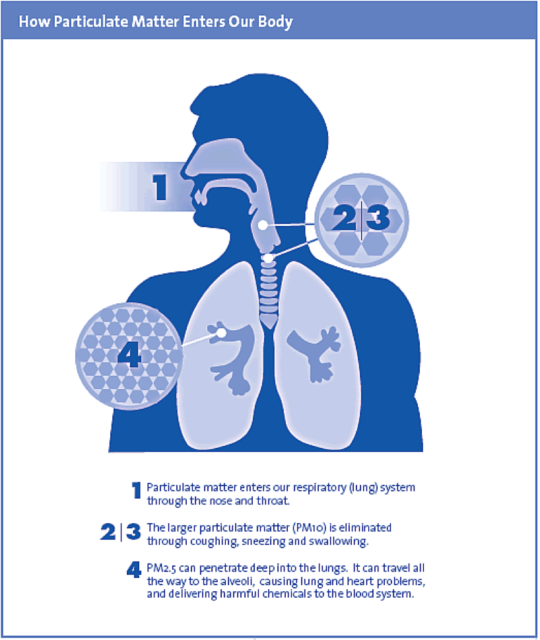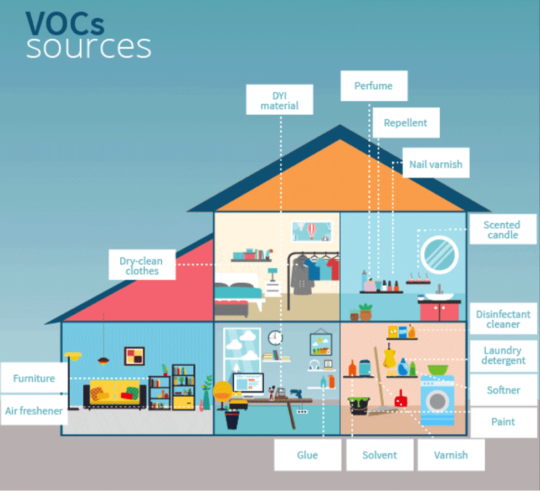
Study Reveals Major Health Threat in Your Home
- New health threat takes a back seat only to high blood pressure, poor diet, and smoking.
- Are you breathing in these cancer causers and heart attack triggers? Find out more…
- Discover one simple way to find out exactly which toxins are in your home.
Dear Living Well Daily Reader,
“Go get some fresh air…”
That’s a suggestion you may not hear much longer.
In fact, according to new research, it’s a suggestion you should probably ignore now… if you care about your health.
Not because taking a “breather” is a bad health practice.
No, taking a deep breath can have all sort of health benefits… except when it’s done in a toxic environment.
And according to a disturbing report released by the International Energy Agency (IEA) on Monday, chances are every breath you take has something bad in it.
The report shows that air pollution has become a public health catastrophe liable for the premature deaths of 6.5 million people every year.1
This means air pollution is now the fourth-largest human health threat, just after high blood pressure, poor diet, and smoking.1
But the bad news gets worse.
Without action, death by air pollution will continue to rise. By the year 2040, the estimated death toll will reach 7.5 million.
So why exactly is air pollution deadly?
![]() More Particles, More Problems
More Particles, More Problems
Many factors add to air pollution levels including, industrial manufacturing, fossil fuel-based transportation and shipping sources, and even natural occurrences like volcanic activity.
However, according to the IEA’s report, the release of harmful pollutants is mostly due to unregulated production and use of energy, which creates particulate matter (PM).
PM contains acid, dust, metal, soil particles, and mold spores, which not only create air pollution, but are also responsible for reduced visibility or haze (think smog).

Source: bcairquality.ca
Miniscule PM is particularly problematic for your heath, because these tiny particles can get deep into your lungs, and some can even enter your bloodstream.
But more importantly, PM can cause deadly health issues like heart disease, strokes, and lung cancer with long-term exposure.
Not to mention PM can also trigger devastating symptoms like heart attack, aggravated asthma, irregular heartbeat, and decreased lung function through inflammation. 3
In addition to particulate matter, volatile organic compounds ( VOCs) contribute to the health issues associated with air pollution. VOCs are released from fuels, chemicals, and solvents and evaporate into surrounding air.
VOC levels are consistently higher in indoor environments. In fact, they can be up to 10 times higher than outdoors. One reason for this is the use of chemicals, paints, adhesives, cleaners and other household products.

Source: foobot.io
VOCs including benzene and formaldehyde are linked to a range of detrimental health effects like eye, nose, and throat irritation; headaches; loss of concentration; and nausea. More serious heath endpoints include liver damage, kidney damage, central nervous system damage, and cancer.4
However, since most folks spend a majority of time indoors these days, exposure to VOCs and mold spores is likely more prevalent.
![]() Breathe Easy
Breathe Easy
Unfortunately, the only universal resolve for decreasing air pollution is to decrease energy production or at the very least, make it more efficient. And since these actions are in the hands of policymakers and energy producers, any possible improvements will be a long time coming.
But there is something you can control – your home indoor air quality.
The first step to take is to figure out exactly what level of air pollution is inside your home.
You can do this with a home air test.
The most comprehensive home air tests use a sampling pump to collect air from your home and then a lab for analysis. I recommend using Home Air Check.
They will mail you a pump and test kit. Once you mail it back in, they will analyze your sample and send you the results and a detailed report of likely sources of VOCs in your home.
This easy-to-read report will also include targeted advice for improving your indoor air quality.
In addition, Home Air Check uses a lab accredited by the American Industrial Hygiene Association. This accreditation takes months to complete and ensures the lab is fully competent in conducting air quality testing.
Click here to discover more about Home Air Check.
We are using Home Air Check to find out what’s in the air here at the Living Well HQ. We will share the results with you as soon as we get them in. Stay tuned for that!
Live well,

Natalie Moore
Managing editor, Living Well Daily
P.S. Do you currently use an air filtration system? If so, what kind? Let me know!
nmoore@lfb.org
Sources
[1] Energy and Air Pollution 2016 – World Energy Outlook Special Report
[4] Volatile Organic Compounds (VOCs)
Written By Natalie Moore
Natalie Moore is a dedicated health researcher with a passion for finding healthy, natural, and science-based solutions. After a decade of direct healthcare experience in western and natural medicine, she was involved in public health research before joining Living Well Daily.
View More Free Articles
Why Your Muscles Are Your Brain's Best Defense
Forget expensive brain scans and head-scratching cognitive tests that make you feel like you’re back in school. Japanese researchers have stumbled onto something that could change how we screen for memory problems—and it’s so simple, you’ll wonder why nobody thought of it sooner. A quick, painless measurement you can get during a routine checkup might...
Four Carbs that Could Add YEARS to Your Life
You’ve likely been avoiding carbs like the plague. Health gurus, fitness influencers, and diet books have convinced you that carbs are the enemy—that they spike your blood sugar, pack on pounds, and fast-track you to diabetes. So you’ve eliminated bread, sworn off pasta, and feel guilty just touching a piece of fruit. But what if...
Upgrade from Bananas and Apples to These Powerhouse Fruits
I’m often asked which fruits are the best. So, let’s talk about it. I’ll cut right to the chase: berries win this contest hands down. If you’re limiting your options to apples and bananas, you’re missing out on a universe of superior antioxidant power. Those everyday fruits are like bringing a knife to a gunfight...
The REAL Reason Americans are Getting “Fatter”
You’ve heard it a thousand times: “Americans are getting fatter because we’re lazy.” We sit at desks all day. We binge-watch Netflix instead of hitting the gym. We’ve traded physical labor for sedentary lifestyles. It’s a tidy explanation for why obesity has skyrocketed in developed countries. There’s just one problem—it’s completely wrong… A groundbreaking Duke...
Mailbag: Room Won't Stop Spinning? Do THIS First
“I’m dealing with vertigo issues, lightheadedness, and dizziness. As recently as this last Saturday I had multiple occurrences throughout the day. Is there anything I can do for this? I’m 69 and in good health. I work out 4 to 5 times a week.” —Spinning Hi Spinning, When patients approach me with similar complaints, I...
Hidden Number Secretly Sabotages Male Performance
Guys (and gals that love them), we should talk. You know how we’ve always been told that bedroom troubles are just part of getting older—that we just need to live with them? Well, it turns out that’s not true. Scientists recently wrapped up a six-year study that followed over 100 healthy men, and the findings...
Shocking Study Links Kids' Snacks to Dangerous Early Puberty
Kids are growing up in a world vastly different from the one we knew. Back in our day, if a child wanted something sweet, it was a piece of candy or a homemade cookie. Today’s kids are surrounded by products filled with artificial sweeteners that didn’t even exist when we were raising our own children....
Outdated Vitamin Guidelines Put Your Brain at Risk
If you’re like most people, you probably don’t think twice about vitamin B12—until your doctor mentions it during a routine blood test. But new research published in the Annals of Neurology suggests we need to pay closer attention to this crucial nutrient—especially as we age. Turns out, current guidelines for this essential nutrient might be...
The TRUTH About Supplement "Liver Dangers" REVEALED
There’s been a lot of buzz lately about liver damage from supplements—so, let’s talk about it. Reports of supplement-induced liver injuries have some folks wondering, “Could my natural remedy actually be harming me?” But before you toss all your supplements in the trash, let’s separate fact from fear—and talk about how to use supplements safely....
The 10,000 Steps LIE That's Ruining Your Health
I’ll be honest—I’m a little sick of the 10,000-steps theory. You know, the one that insists you need to take at least that many steps daily to stay healthy? You won’t believe where that claim originally came from. The 10,000-steps theory wasn’t handed down from the fitness gods on stone tablets. It originated from a...









